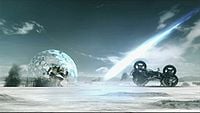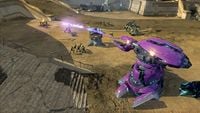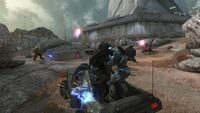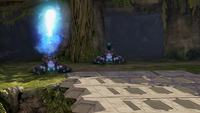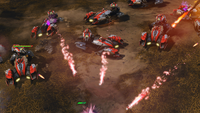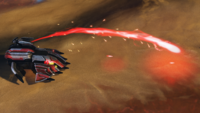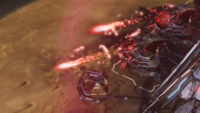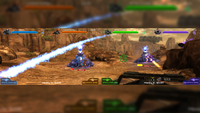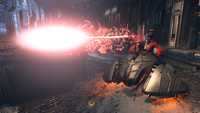Plasma mortar
From Halopedia, the Halo wiki
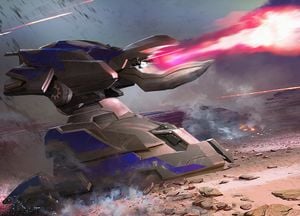
The plasma mortar, also known as energy mortar,[1] is a classification of plasma-based artillery weapon.[2]
The plasma mortar launches shaped blast of superheated plasma, which arc in a parabolic trajectory and explode violently upon impact.[3] As with any mortar weapon, the plasma mortar serves as an excellent long range bombardment style projectile. The arching projectiles allow the operator to stay at a particular position, without the worry of having to aim projectiles around or over terrain.
Since they can be mounted on a variety of emplacements or vehicles, plasma mortars are employed similarly in a variety of roles, including anti-personnel,[4] anti-vehicle, and shelling fortifications.[2]
Known types[edit]
Burst cannon[edit]
- Main article: Ra'aam-pattern burst cannon
While originally designed as a naval weapon aboard aging warships of the Sangheili, the Ra'aam-pattern burst cannon was taken by Jul 'Mdama's Covenant and repurposed as an emplaced plasma mortar.[5]
Class-2 medium plasma mortar[edit]
- Main article: Class-2 medium plasma mortar
The Class-2 medium plasma mortar is mounted on the rear of the Rizvum-pattern Revenant.[6][7] While charging, the plasma blast possesses a bluish tinge, though it is red when it is fired. The weapon has a less pronounced parabolic arc than its larger counterparts.[8]
Incendiary plasma mortar[edit]
Each N'weo-pattern Gigas craft is armed with two incendiary plasma mortars, allowing the fighter-bomber to deploy incendiary carpet bombs.[9]
Infantry-deployed energy mortar[edit]
There is a Covenant infantry-deployed energy mortar.[10] These mortars require at least a trio of Unggoy to assemble on-site, but once assembled, they can generate energy shielding for protection.[11]
Heavy plasma mortar[edit]
- Main article: Heavy plasma mortar
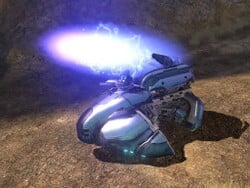
The heavy plasma mortar is the primary armament of the Wraith.[12][13] It launches a plasma blast that is typically a blue-white orb which travels slowly in the air.[3] However, upon impact, the plasma blast obliterates everything at the point of impact,[1] all the while leaving a large crater on ground in its wake.[3] The plasma mortar's main use lies in shelling and vehicular warfare,[14] but it is also fairly effective in closer engagements.[15] The heavy plasma mortar has seen numerous variations, including, but not limited to, the scorch plasma mortar on Ironclad Wraiths and an infusion-modified variant on Terror Wraiths.[16]
Plasma mortar[edit]
The seemingly standard variant of the plasma mortar fires medium-sized blasts of superheated plasma. While it was an optional armament on the Kewu Umppi'pa'-pattern citadel turret during the Human-Covenant War,[4][17] it is primarily mounted on the Banished’s Eklon'Dal Workshop Marauder.[18]
Siege plasma mortar[edit]
The siege plasma mortar is mounted on the Covenant's stationary Emp'seam-pattern Antlion and its Banished successor, the Eklon'Dal Workshop Antlion. The siege plasma mortar fires a devastating volley of plasma torpedoes[19] at an astonishing range, easily turning enemy fortifications into glassy craters.[17] The Banished variant is heavily augmented and overclocked to increase its effectiveness and range.[20]
Ultra-heavy plasma mortar[edit]
The ultra-heavy plasma mortar is mounted on the Covenant's stationary Zo'op-pattern Weevil, which provides fire support over large segments of enemy-contested area.[17]
XM4600 Zeus plasma munition howitzer[edit]
- Main article: XM4600 Zeus plasma munition howitzer
The XM4600 Zeus plasma munition howitzer is the closest equivalent to a plasma mortar employed by the United Nations Space Command. Reverse-engineered from Covenant technology, the weapon fires a 320mm artillery shell with fuel rod filler that unleashes a powerful barrage of plasma at its targets.[21][22] It is mounted on M145D Rhino prototypes, which were used in at least 2531, when five of these were used by Professor Ellen Anders to collapse a Covenant energy shield during the Battle of Arcadia.[23]
Production notes[edit]
- Plasma mortars may have been inspired by the Plasma Bugs in the film adaptation of Starship Troopers.
- The Covenant Air Artillery, a unit cut from Halo Wars, would have used three plasma mortars.
- Early Halo: Reach concept art by Glenn Israel featured a Covenant mortar held in a manner akin to the Brute Shot or Pek-pattern plasma cannon, or able to be deployed as a static emplacement. Some of the sketches of the weapon drew influences from the plasma mortars on Revenants and Wraiths.[24]
Gallery[edit]
A blast from a Zurdo-pattern Wraith's heavy plasma mortar moments before impact in Starry Night.
The anti-infantry variants of the Kewu Umppi'pa'-pattern turrets with mounted plasma mortars in Halo Wars.
A blast from an Emp'seam-pattern Antlion's siege plasma mortar arcing through the air in Halo Wars.
Two Rizvum-pattern Revenants fire their medium plasma mortars at a M12G1 Gauss Warthog in Halo: Reach.
A Muz-pattern Wraith fires its heavy plasma mortar in Halo 2: Anniversary.
A group of Eklon'Dal Workshop Marauders firing their plasma mortars in Halo Wars 2.
An Eklon'Dal Workshop Wraith firing its heavy plasma mortar in Halo Wars 2.
Two Eklon'Dal Workshop Antlions firing their siege plasma mortars in Halo Wars 2.
The arc of a plasma blast from a Muz-pattern Wraith's heavy plasma mortar in Halo: Fireteam Raven.
A Bolroci Workshop Wraith firing its heavy plasma mortar in Halo Infinite.
List of appearances[edit]
Sources[edit]
- ^ a b Halo: First Strike, chapter 12
- ^ a b Halo Encyclopedia (2011 edition), page 347
- ^ a b c Halo: The Flood, chapter 6
- ^ a b Halo Wars, Covenant citadel base turret
- ^ Halo Encyclopedia (2022 edition), page 305
- ^ Halo: The Essential Visual Guide, page 154
- ^ Halo Encyclopedia (2022 edition), page 275
- ^ Halo: Reach, Revenant in-game vehicle
- ^ Halo Encyclopedia (2022 edition), page 289
- ^ Halo: Ghosts of Onyx, chapter 38
- ^ Halo: Ghosts of Onyx, chapter 39
- ^ Halo 4: The Essential Visual Guide, page 117, 228
- ^ Halo Encyclopedia (2022 edition), page 274
- ^ Halo Encyclopedia (2011 edition), page 257
- ^ Halo Waypoint, Wraith (Retrieved on May 11, 2021) [archive]
- ^ Halo Encyclopedia (2022 edition), page 469
- ^ a b c Halo Encyclopedia (2022 edition), page 305
- ^ Halo Encyclopedia (2022 edition), page 464
- ^ Halo Wars 2, Phoenix Logs: Mega Turret
- ^ Halo Encyclopedia (2022 edition), page 481
- ^ Halo: The Essential Visual Guide, page 155
- ^ Halo Encyclopedia (2022 edition), page 141
- ^ Halo Wars, campaign level Dome of Light
- ^ Instagram, Glenn Israel: "Halo Reach - Covenant mortar exploratory sketches (2009)" (Retrieved on Apr 28, 2022) [archive]
